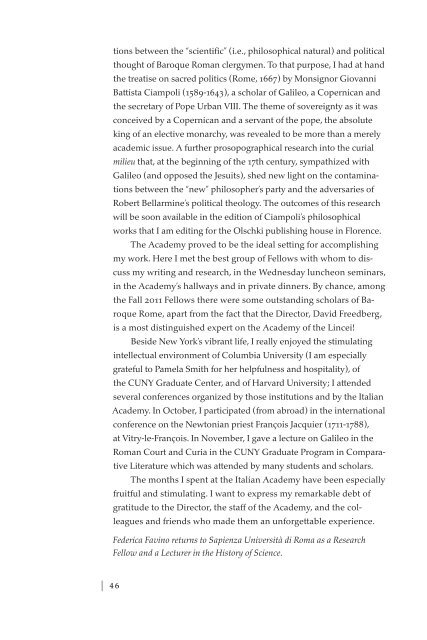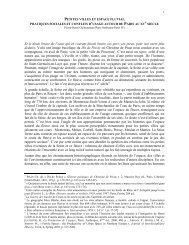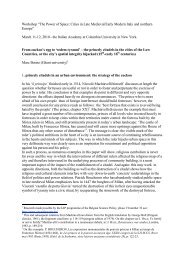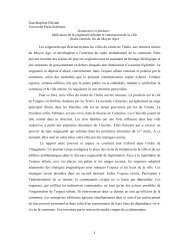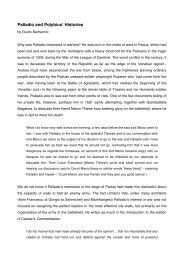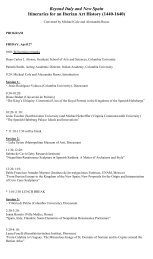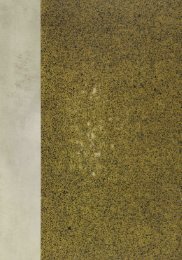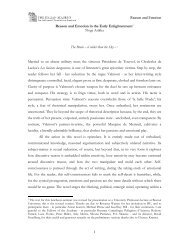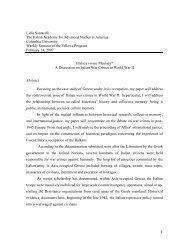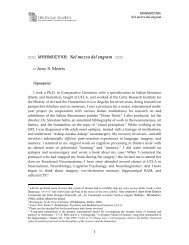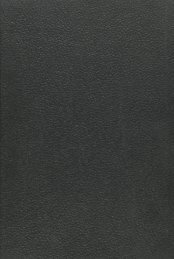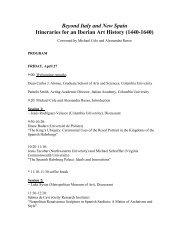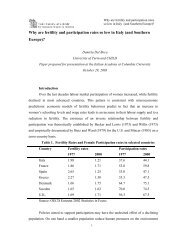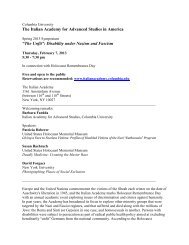2011-2012 - The Italian Academy - Columbia University
2011-2012 - The Italian Academy - Columbia University
2011-2012 - The Italian Academy - Columbia University
You also want an ePaper? Increase the reach of your titles
YUMPU automatically turns print PDFs into web optimized ePapers that Google loves.
tions between the “scientific” (i.e., philosophical natural) and political<br />
thought of Baroque Roman clergymen. To that purpose, I had at hand<br />
the treatise on sacred politics (Rome, 1667) by Monsignor Giovanni<br />
Battista Ciampoli (1589-1643), a scholar of Galileo, a Copernican and<br />
the secretary of Pope Urban VIII. <strong>The</strong> theme of sovereignty as it was<br />
conceived by a Copernican and a servant of the pope, the absolute<br />
king of an elective monarchy, was revealed to be more than a merely<br />
academic issue. A further prosopographical research into the curial<br />
milieu that, at the beginning of the 17th century, sympathized with<br />
Galileo (and opposed the Jesuits), shed new light on the contaminations<br />
between the “new” philosopher’s party and the adversaries of<br />
Robert Bellarmine’s political theology. <strong>The</strong> outcomes of this research<br />
will be soon available in the edition of Ciampoli’s philosophical<br />
works that I am editing for the Olschki publishing house in Florence.<br />
<strong>The</strong> <strong>Academy</strong> proved to be the ideal setting for accomplishing<br />
my work. Here I met the best group of Fellows with whom to discuss<br />
my writing and research, in the Wednesday luncheon seminars,<br />
in the <strong>Academy</strong>’s hallways and in private dinners. By chance, among<br />
the Fall <strong>2011</strong> Fellows there were some outstanding scholars of Baroque<br />
Rome, apart from the fact that the Director, David Freedberg,<br />
is a most distinguished expert on the <strong>Academy</strong> of the Lincei!<br />
Beside New York’s vibrant life, I really enjoyed the stimulating<br />
intellectual environment of <strong>Columbia</strong> <strong>University</strong> (I am especially<br />
grateful to Pamela Smith for her helpfulness and hospitality), of<br />
the CUNY Graduate Center, and of Harvard <strong>University</strong>; I attended<br />
several conferences organized by those institutions and by the <strong>Italian</strong><br />
<strong>Academy</strong>. In October, I participated (from abroad) in the international<br />
conference on the Newtonian priest François Jacquier (1711-1788),<br />
at Vitry-le-François. In November, I gave a lecture on Galileo in the<br />
Roman Court and Curia in the CUNY Graduate Program in Comparative<br />
Literature which was attended by many students and scholars.<br />
<strong>The</strong> months I spent at the <strong>Italian</strong> <strong>Academy</strong> have been especially<br />
fruitful and stimulating. I want to express my remarkable debt of<br />
gratitude to the Director, the staff of the <strong>Academy</strong>, and the colleagues<br />
and friends who made them an unforgettable experience.<br />
Federica Favino returns to Sapienza Università di Roma as a Research<br />
Fellow and a Lecturer in the History of Science.<br />
| 46


